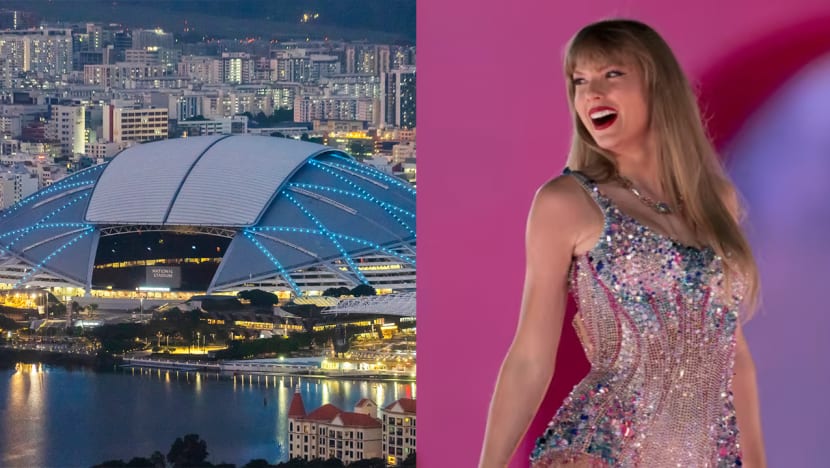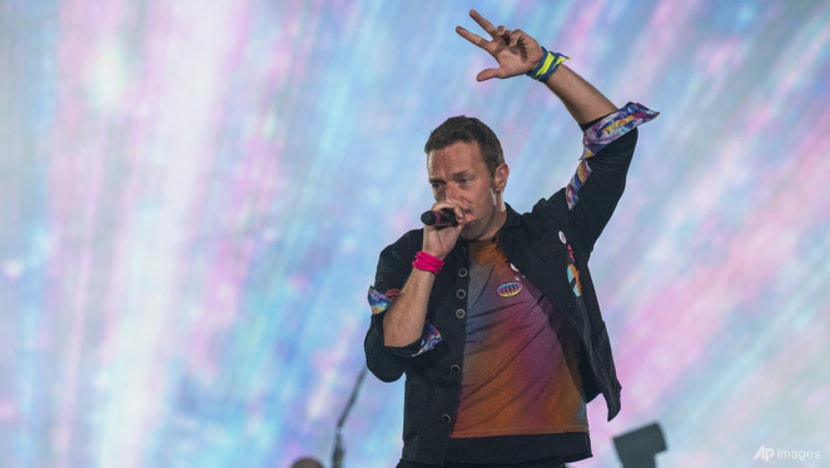Sound quality affects 'emotional connection' to artiste: Experts on National Stadium's lack of acoustic design
Singapore's National Stadium has received complaints about its poor sound at previous concerts. With fans desperate to score tickets to Coldplay and Taylor Swift performances there next year, CNA explores how sound quality affects the concert experience.

Taylor Swift will bring her The Eras Tour to Singapore's National Stadium in March 2024. (Photo: iStock/Kokkai Ng, AP/George Walker IV)
SINGAPORE: While the spotlight will be on Coldplay and Taylor Swift next year when they each perform an unprecedented number of shows in Singapore, the National Stadium’s sound quality will take centre stage too.
The 55,000-capacity venue is no stranger to audio troubles at concerts.
In December 2022, complaints about the sound system during Mandopop singer Jay Chou’s concert made headlines. Older news reports have also highlighted the “murky” and “muffled” sound at the stadium’s concerts since local singer Stefanie Sun held the first pop gig there in July 2014.
The stadium’s sound woes have not deterred diehard fans – all six of Coldplay’s shows were sold out, while presale tickets for Taylor Swift were snapped up within three hours on Wednesday (Jul 5).
But the lucky ones who manage to snag tickets would have certain expectations for their concert experience, which will largely depend on how their favourite artiste sounds, said sound designers and engineers who spoke to CNA.

SOUND AFFECTS "CONNECTION" TO ARTISTE
Any artiste and their crew aim to “create a once-in-a-lifetime experience for the audience at an emotional and psychological level”, which is why sound is “so important”, said acoustics designer Edric Hwang.
“It is the single connecting factor between the performer and the audience. It’s what delivers the emotion and the experience. Visuals are what keeps us looking forward to the stage, but what we hear is what connects us to it,” he said.
“By compromising on sound quality, you compromise on the one thing concertgoers are there for – the emotional connection.”
Mr Hwang admitted Coldplay’s concert in January will be his first concert at the National Stadium, largely due to the “terrible reviews” he has heard about the stadium’s sound, not least from fellow music and audio professionals.
Echoing Mr Hwang, live sound engineer Mark Spencer added that the average audience member these days “wants to experience the artiste and their heroes more up close, and essentially clearer and more intimately”.
But that is hard to achieve in a larger venue, like the National Stadium, unless one stands right in front of the stage.
Mr Spencer, who has worked with various artistes on differing scales of shows in venues around the world, acknowledged that some concerts focus on the “spectacle of the performance” where “vibe and atmosphere” are key.
But at concerts of artistes who focus on songwriting, such as local singer JJ Lin whom Mr Spencer has worked with, he believes “a lot of that experience comes from what you hear as well, because you’re primarily there to hear the music”.
BETTER EQUIPMENT, BETTER SOUND?
To mitigate potentially poor sound quality, Mr Spencer said bands who can afford it bring along their own sound system on tours, rather than depend on what the venue has or what the concert promoter decides to rent.
But this culture, he noted, is more prevalent in Europe or the US.
Locally, concert promoters install a different sound system comprising different equipment for every show according to the artiste’s specifications, explained Mr Ross Knudson, director of concert promoter LAMC Productions.
International artistes do bring their own sound engineers, most of whom conduct a sound check a few hours before the concert “just to make sure everything is okay”, he said.
“It’s up to the artiste’s sound engineer to make it work to the best of their ability, along with the audio that is locally supplied according to the specifications in the artiste’s production rider.”
Mr Hwang, whose expertise in sound and acoustic design is exclusive to professional music and audio production spaces, added that the equipment for every concert depends on the size of venue, estimated size of audience, type of performance and various technical factors.
However, he pointed out, the sound quality of any space is dependent on more than just the equipment. Equally important is the venue’s acoustic design – or lack thereof.
“The best equipment in the world won’t make a badly designed venue sound good, and vice-versa. The two play hand-in-hand,” he said.
“The only difference is that the equipment is a variable factor that can be controlled by the organiser’s team, whereas acoustics unfortunately cannot since it’s built into the venue.”
And the National Stadium’s fundamental issues with sound, Mr Hwang believes, cannot be “tackled entirely from an equipment perspective”.
Instead, the problem stems from the “foundational lack of acoustic design” for the stadium, he suggested, and suspects the acoustic design was “not heavily prioritised” since the stadium wasn’t built solely for concerts.
The National Stadium is a “great venue for large-scale events where sound is not as important as it is for concerts”, such as sports and community events, he said.
NOT DESIGNED WITH ACOUSTICS IN MIND
The Singapore Sports Hub, which oversees the National Stadium, states on its website that the stadium is “much more than a place for sporting events”.
It is the “nation’s centrepiece for sporting, entertainment, lifestyle and national events”.
Mr Spencer, however, believes the stadium’s design priority was “probably about seating capacity and how many seats they can cram in”.
“If you want to make money, then it’s about how many tickets you can sell. At the end of the day, I think a lot of these venues are not really prioritising audio quality, or even visuals or lighting,” he said.
Although he understands that the National Stadium’s seating capacity and infrastructure allows it to rent out the space for concerts and other events, this leads to vendors and sound engineers dealing with “an environment that’s not primarily for live sound”.
Sports stadiums like the National Stadium tend to be “very reverberant on purpose”, he added, because “you want to have the excitement of the crowd cheering and you're trying to give the home team the advantage”.
While audio manufacturers have designed predictive software to indicate where and how many speakers to place to achieve a certain sound, he noted that such software usually doesn't take into consideration the surfaces in the venue.
One way to mitigate the reflections in the National Stadium, he added, is to open up the roof. But that costs “quite a lot of money”, so there is “a tradeoff”.
Another factor that could affect sound quality is the temperature at a venue, Mr Spencer pointed out.
The heat at the National Stadium during K-pop band Blackpink’s concert in May made headlines, even though there were no reports of sound issues.
“Sound propagates through the air, like through waves. The warmer it is, the less dense the air; the colder it gets, the air is actually more dense, so it’s harder to (have) sound especially in the higher frequencies which is where all the clarity is,” he explained.
But in Singapore, it’s humid most of the time, he said. “If there’s a lot of moisture in the air, that also stops the propagation of sound.
“Essentially, if you really want good sound, you need to be near the speakers because then you have very direct sound,” he added.
“You (want to) try to give everybody direct sound rather than giving reflections. But in order for that to happen, you need to deploy more speakers, which is more budget and more setup time as well. It’s more manpower, more cost.”
ECONOMICS OF CONCERT BUSINESS
With internationally acclaimed artistes like Coldplay and Taylor Swift making Singapore a multi-day tour stop, the country is on its way to cementing its branding as an entertainment hub, tourism experts previously told CNA.
Such artistes are drawn to Singapore for various reasons including its state-of-the-art event facilities, easy connectivity to other Southeast Asian cities, stable governance and promotion efforts by the Singapore Tourism Board.
As such, despite the National Stadium’s limitations, turning it into a concert venue boils down to business, said LAMC’s Mr Knudson.
“Sports arenas are generally not designed for live music, but the economics of the concert business require them to be used because they can accommodate higher capacities.”
Selecting the venue is also about dollars and cents, as concert promoters who pay for the audio equipment for the artiste will have to balance between expenditure and profit, said Mr Spencer.
Illustrating the eye-watering cost of renting audio equipment, he noted that most companies charge per concert day with rehearsals costing an additional sum. Should artistes choose to put in temporary infrastructure, the cost of venue rental also increases.
“If we’re looking at something the size of Coldplay, the rental will be north of S$250,000 for the entire week just for the audio itself. Whereas if you’re looking at Indoor Stadium, that S$250,000 will give you your entire production – lighting, sound, video and whatever else,” he said.
Ultimately, a concert promoter’s venue choice is “very dependent” on the genre, the artiste and “especially the artiste’s fan base, the size of their fanbase and the expectations of the artiste and their fanbase”, added Mr Knudson.
He acknowledged that a venue is “critically important” to create “the vibe of the show” for the artiste and fans, as the sound and ambience of the venue will help make the show a success.
But in the end, the “most important element is always the artiste”, he added. “Fans will generally go wherever their favourite artiste performs.”


















